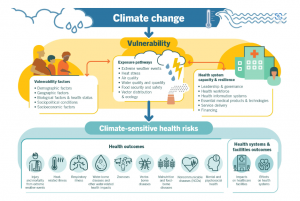
World leaders and senior officials have descended on Sharm El Sheikh in Egypt to take part in the UN climate change conference. COP27 has taken a definite step towards addressing the pending issues by adding loss and damage funding as an official agenda. With extreme weather events bringing climate change closer to most inhabitants of the earth, the climate conference presents an opportunity for world nations to demonstrate their ability to take concerted action to check global warming.
While world leaders are focused on issues such as net zero and climate finance, adequate attention is not being paid to the health impact of climate change. There is a need for more in-depth studies into the relationship between environment and public health.

READ I COP27: Little optimism around UN climate change talks
COP27: Need for health focus
Climate change has major health implications for millions of people as it makes them vulnerable to disease. The extreme weather events triggered by climate change also have a disproportionate impact on deprived communities. Human health is intrinsically linked to the ecosystems around them. These ecosystems face destruction due to deforestation, agriculture, urbanisation and changes in land use.

Climate change may cause 250 000 additional deaths every year between 2030 and 2050 because of varied reasons such as malnutrition, malaria, diarrhoea and heat stress. The economic cost of the health impact of climate change is expected to be in the range of $2–4 billion every year by 2030.
The impact of environmental degradation and air pollution on health can be reduced by enhancement of public transport systems and by creating more green spaces in urban areas. Climate resilience and stronger food and health systems can be created through community participation. These would be extremely important for vulnerable communities and small island developing states which are suffering the most from extreme weather events.
READ I COP27: Reparations, energy crisis to dominate climate change conference agenda
The impact of climate change is felt on food security for millions of people in Africa, Asia, and Latin America. A series of drought years in the Horn of Africa and floods in Pakistan have led to children facing acute hunger and malnutrition. The impact will be felt in these areas with over 33 million people affected and public health infrastructure damaged.
This is the basis of the demand that climate policy must be made central for climate change mitigation policies. This will help the planet achieve cleaner air, safer freshwater and food, and effective health and social protection systems. The investments in clean energy will be repaid by the health gains from them. It is estimated that investments in higher vehicular emission standards can save at least 2.4 million lives every year.
Recent studies say at least seven million people die of air pollution and extreme weather events every year. The impact of climate change on human health is difficult to measure. It is estimated that close to 25 million people were displaced by environmental disasters, affecting mental health of people and causing trauma. There haven’t been many efforts to estimate the mental health consequences of extreme weather events. One can only hope that the world leaders assembled in Egypt will show some urgency to address the physical and mental health consequences of climate change.

